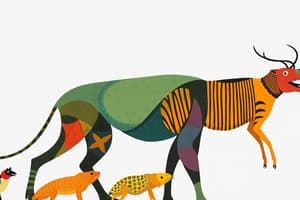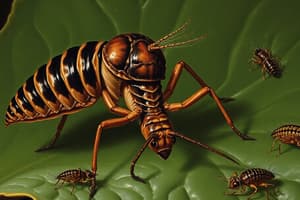Podcast
Questions and Answers
Why are sea anemones, earthworms, and squid all classified as invertebrates?
Why are sea anemones, earthworms, and squid all classified as invertebrates?
They all lack backbones.
List the six major groups of invertebrates.
List the six major groups of invertebrates.
sponges, cnidarians, worms, echinoderms, mollusks, and arthropods.
Which invertebrate group has no symmetry, no cephalization, and no gut?
Which invertebrate group has no symmetry, no cephalization, and no gut?
sponges
Which two invertebrate animals groups have radial symmetry?
Which two invertebrate animals groups have radial symmetry?
Because most worms are round in cross-section, they are considered to have radial symmetry.
Because most worms are round in cross-section, they are considered to have radial symmetry.
The spiny-skinned invertebrates are:
The spiny-skinned invertebrates are:
What characteristic can be used to distinguish different groups of arthropods?
What characteristic can be used to distinguish different groups of arthropods?
You find an animal with an exoskeleton and jointed legs. Which invertebrate group does it belong to?
You find an animal with an exoskeleton and jointed legs. Which invertebrate group does it belong to?
Flashcards are hidden until you start studying
Study Notes
Invertebrates Overview
- Sea anemones, earthworms, and squid are classified as invertebrates due to the absence of backbones.
Major Groups of Invertebrates
- Six primary invertebrate groups: sponges, cnidarians, worms, echinoderms, mollusks, and arthropods.
Sponges Characteristics
- Sponges are unique among invertebrates as they exhibit no symmetry, lack cephalization, and do not possess a gut.
Radial Symmetry in Invertebrates
- Cnidarians and echinoderms are the only invertebrate groups that demonstrate radial symmetry.
Worms and Symmetry
- Common misconception: While many worms are round in cross-section, they possess bilateral symmetry rather than radial symmetry.
Echinoderms Identification
- Echinoderms, known as spiny-skinned invertebrates, contain species such as starfish and sea urchins.
Arthropod Classification
- The distinguishing feature of different arthropod groups is the number of legs, which serves as a key characteristic in identification.
Exoskeleton and Jointed Legs
- Animals possessing an exoskeleton and jointed legs are categorized under arthropods, which include insects and crustaceans.
Studying That Suits You
Use AI to generate personalized quizzes and flashcards to suit your learning preferences.




